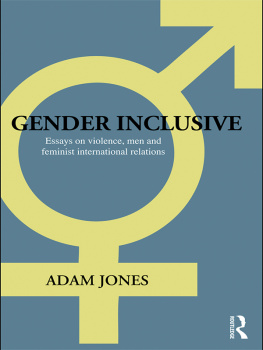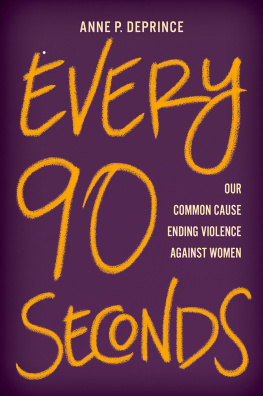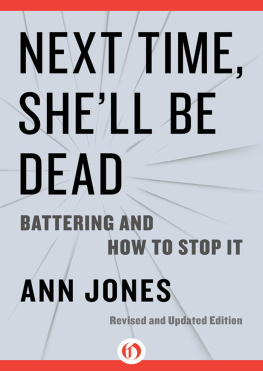Preface to the Revised Edition
When this book was first published in 1994, I wanted to call it Battery. You cant call it that, the publishers marketing expert said. People will think of the Energizer bunny. He came up with a better idea: Next Time, Shell Be Dead. Oh, great, I said. You expect people to know what that means? Then a battered woman was found on her doorstep in Los Angeles with her throat cut, and her husband, O. J. Simpson, was arrested. Nobody ever seemed puzzled by the title of my book. That was my first clue that Americans already knew far more about battering than they were letting on.
In the six years since the book was first published, remarkable things have happened. The President of the United States spoke out against battering and child abuse and told the world that as a child he had witnessed abuse of his own mother. Two women he appointed to his cabinet, Secretary of Health and Human Services Donna Shalala and Attorney General Janet Reno proved to be strong leaders on the issue. Congressa Republican Congress at thatprovided a million dollars for the Texas Council on Family Violence to establish a National Domestic Violence Hotline. Congress provided funds for battered womens advocates to establish several national resource centers to provide information and technical assistance on aspects of domestic violence. Congress passed the Violence Against Women Act. The American Medical Association got involved, and businesses like Liz Claiborne and Marshalls and Polaroid. At the movies Laurence Fishburne played a murderous jealous husband named Othello, and on television when the mother of NYPD Blues Detective Diane Russell shot her dad, everyone knew the bastard deserved it. The Dixie Chicks had a hit with an upbeat song about getting even with an abusive husband: Goodbye Earl.
Is this victory? Is the fight against battering over? Can you skip this book? I dont think so. But times may be changing. Recent polling by the Family Violence Prevention Fund indicates that most Americans now believe that battering is wrongand short of intervening personally, most Americans would like to do something to stop it.
To reflect changing times, Ive amended a few passages in the introduction to this edition; and Ive revised the last chapterWhat Can We Do?to describe the changes in policies and practices of the last six years and the opportunities for anyone who wants to take action against battering.
The biggest change is the Internet. It enables the scattered enclaves of the nationwideactually worldwidebattered womens movement to share and disseminate what theyve learned in a quarter-centurys work. To write this book in the early 1990s I traveled to domestic violence programs, shelters, conferences, libraries, prisons, police departments, court rooms, colleges, social service agencies, law schools, hospitals, batterers programs, battered womens support groups, and more all across the country. To revise it I sat at home at my computer with a modem and a telephone. Today you too can dial up or download anything you want to know about the problem of violence against women. Better yet, you can find out how to take effective action to end it.
A.J.
January 20, 2000
Introduction
Violence changes those it touches. A generation of veterans home from Vietnam taught us that. But Im thinking now of other veterans of violence closer to homeviolence in the home. We label this violence domestic, as if it were somehow tamer than the real thing, but newspapers and newscasts list casualties. They report that such violence rages wild among us, as uncontrolled as an epidemic. People who go through it, as victims or as witnesses, learn (among many things) to fear violence, to avoid violence at all costs, or to be violent. Many veterans of family violence suffer recurrent, paralyzing flashbacks, just like war veterans, afflicted with the same psychiatric disorder: post-traumatic stress. Many skid into alcoholism, drug addiction, assault, suicideas if to finish the destructive process begun by someone else. Others find that memory mends itself, blotting out the worst of violence, so they can get on with life, troubled only now and then by some imperfectly forgotten wound. But once youre struck by violence, its prospect covers things, like shade. Survivors may develop a determination to stop violence, and they may work toward that goal. But even then they may never quite cheer up.
I speak from experience. My father was a drunk, a wife beater, and a child abuser. Thats never the whole story, of course, so he was also other things: a modestly successful businessman, a civic leader, a war hero, an athlete, a prizewinning angler, a churchgoer, a tenor, a patriot, a Republican, a baseball fan, a formidable player of gin rummy. And more important, a delightful and funny man. Of all my family, all now long gone, its my father I miss.
When I was about five, my father went to a rehabilitation center again. This time he sobered up, joined Alcoholics Anonymous, andas far as I knowstopped hitting my mother. Perhaps because I was so young during the worst of his attacks on her, I dont remember much about them at firsthand; but I recall the family storieslike the one about the time my father loaded his revolver, threatening to shoot my mother, and she walked up an enclosed stairway straight into the gun and took it away from him. My mother knew how to stand up for herself. Which may explain why he hit me instead.
The beatings I got from him I remember much better, but even they dim in memory, thanks to the minds readiness to minimize and deny whats too painful to retain. So I cant recall when he started hitting me (I dont remember a time when he didnt) or how often he beat me up; I cant call to mind my fathers face when he attacked me, but half a century later, I can remember exactly the look of the floorboards under my bed, the one place, when I was small enough to scrunch into the far corner and cling to the bed leg, where he couldnt quite get at me.
What I remember most of all is my fathers weepy, groping attempts at making up after hed pounded me with belt buckle or fists. Hed creep into my room in the middle of the night and sit on my bed. If he said anything, Ive forgotten it. He would take me in his arms and press his face, always wet with tears, against mine, and give me big slobbering kisses. He was feeling sorry, not for me but for himself. Id sit bolt upright in his embrace, terrified by itfor nobody ever hugged or kissed in our family in the normal course of thingsterrified by his wet tears and spittle on my face and the hand worming between my legs.
I blamed my mother. If only she wouldnt talk back to him or nag and complain so much about the same old things all the time. (Why












